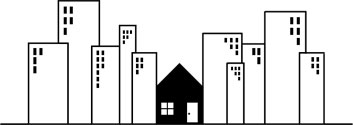An affordable housing bill in the Oregon legislature might not have much immediate impact in Portland’s gentrifying neighborhoods.
Even if it passed tomorrow, a new bill allowing the city to create affordable housing units in new multi-family developments would have little impact in fast-gentrifying communities because it wouldn’t impact renters in the market.
LINK: Monday April 27- Inclusionary Zoning Workshop in SE Portland
House Bill 2564 would allow cities in Oregon to create “inclusionary zoning” laws. Cities could get affordable housing built in new developments by waiving certain fees, permits and building restrictions in exchange for the inclusion of below-market units. While advocates see the bill as a major potential victory for affordable housing, HB 2564 would only impact condo developments, or housing units for sale.
Right now, affordable housing can only be created when an entity, like a government agency or nonprofit, can afford to financially subsidize the unit with cash or tax credits.
On Thursday Peter Wong reported that HB 2564 moved from the House to the Senate. The Oregon legislature banned local municipalities from enacting inclusionary zoning laws in 1999. This was during the filming of our original documentary Northeast Passage. At the time, affordable housing advocates saw the ban as a preemptive move by the homebuilder’s lobby, and pushed for Portland to enact an inclusionary zoning law of its own.
WATCH: Original Documentary Available on Amazon Streaming
Oregon and Texas are the only two states with such bans.
Inclusionary zoning is currently used in over 100 cities across the country, including Boston, SF, Denver and San Diego, according to the Chicago-based public policy think tank Business and Professional People for the Public Interest. That said, even if advocates can overturn the 1999 ban, which seems possible given the overwhelming strength of liberals in the statehouse, HB 2564 might not bring immediate relief to renters.
For example, on the rapidly gentrifying North Williams Avenue, once the heart of the state’s African American community, almost all of the new high-end housing is rental.
LINK: Sequel to 2002 Gentrification Documentary
New rentals on Williams Avenue can fetch as much as $2,300 a month for a two bedroom. All the while, the black community has shrunk to less than half of its size as former residents of the North and Northeast Portland get priced out of the area.
Still, the bill represents big progress in breaking an affordable housing policy log jam that has existed in Oregon for a decade and a half.
“HB2564 is critical legislation in our anti-gentrification work because it creates a path to affordable homeownership for first time buyers who currently can’t break into this market,”said Jessica Larson, director of the Welcome Home Coalition.“There are over 1,000 mortgage-approved families who have completed homeownership programs and are waiting to buy their first home but can’t find any homes left in their neighborhoods that they can afford.”
Larson said that while the bill doesn’t impact renter, “indirectly, I believe HB2546 will have a positive impact on affordable rentals by lightening up pressure on the market.”
Larson said there was a long way to go and her own organization is launching a campaign to create stable funding for affordable housing across the region.
This Monday there will be an inclusionary zoning workshop at the offices of the Southeast Uplift Neighborhood Coalition at 7 p.m.
The event drew an overwhelming response when it was announced on the coalition’s Facebook page. Over 100 people are expected to attend.
“I think people are feeling the pinch of not being able to find places to live,” said Katy Asher with Southeast Uplift. “We’re excited even if it’s (HB 2564) not what everyone wants.” The Welcome Home Coalition will be launching their campaign with a kickoff event on April 29th at El Centro Milagro.

